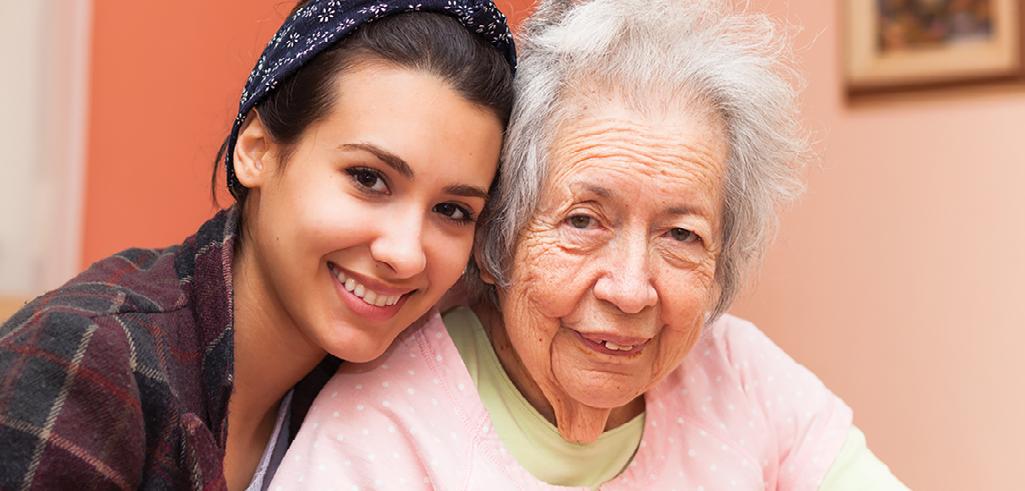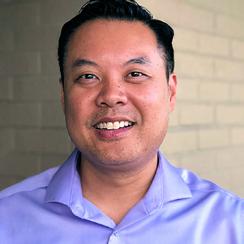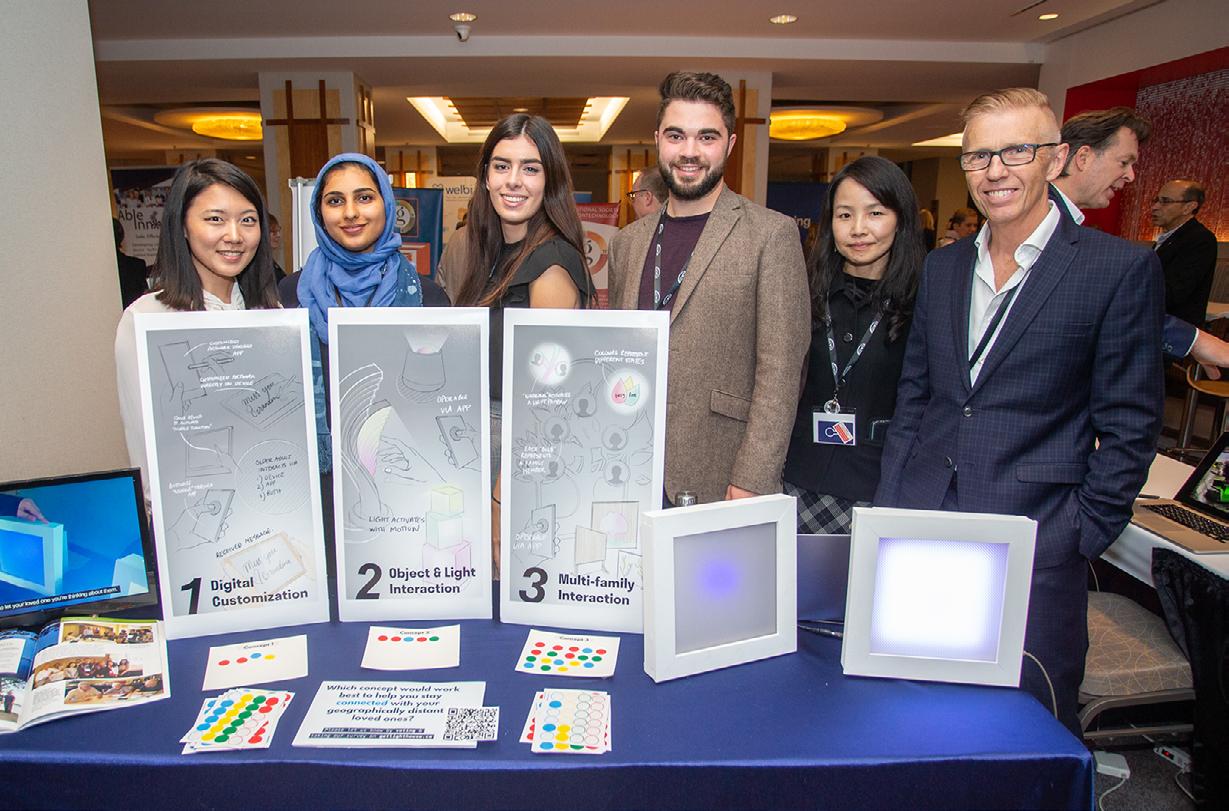
18 minute read
RESEARCH EXCELLENCE
“The AGE-WELL network is one of the best things that has ever happened to the Canadian research scene.
The effectiveness of this network may be unprecedented. ” Dr. Thomas Hadjistavropoulos, Research Chair in Aging and Health, University of Regina
Advertisement
AGE-WELL research focuses on solutions that have real-world impact—and produce social and economic benefits for Canadians. You can see it in everything we do. We are getting an incredible return on investment from projects undertaken in our first five years. An impressive 118 products (technologies, services, policies and practices) are in development or already on the market.
And we’re looking forward. In April 2020, AGE-WELL announced 22 new research projects, which represent an investment of more than $10-million over three years. In total, the projects are led by 48 researchers based at 20 universities and research centres across Canada, and involve over 100 partners from industry, government and non-profit organizations. We believe firmly in this approach which breaks down silos between disciplines and sectors.
Consider the range and relevance of these projects, which include:
• The design of apps to empower older adults to engage in the digital world, reduce social isolation and facilitate meaningful connections to family members
• The development, implementation and evaluation of a culturally safe, Indigenous-led diabetes and weight management telehealth service focused on Indigenous older adults
• The creation of a unique platform to accelerate the validation, commercialization and adoption of home care technologies such as smart-home systems and home health devices.
Dr. Carrie Bourassa’s community-driven project called Indigenous Technology Needs Exploration – Saskatchewan (ITNE) has contributed to innovation in the Indigenous health and dementia fields of study. Dr. Bourassa is a professor at the University of Saskatchewan.
VitalTracer smart watch
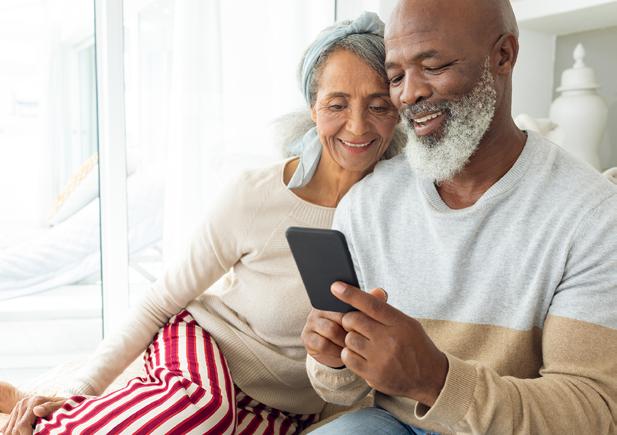
As always, older adults and caregivers are deeply involved in these projects to ensure products are practical and will be used. These stakeholders take part at every level of our network. They participate in studies, advise on research relevancy, and serve on the Older Adult and Caregiver Advisory Committee and the Research Management Committee.
Collectively, the new projects, part of our Core Research Program and Platform Project Program, will drive innovation across AGE-WELL’s eight challenge areas where technology can make a significant difference (see page 19). These challenge areas are more than research themes; they will guide our overall strategic direction going forward.
AGE-WELL also continues to support post-discovery research through a Strategic Investment Program (SIP) Accelerator program. In 2019-2020, we funded eight SIP projects, advancing an array of needed products, such as medication reminders and special mats that monitor health during sleep. Further, we funded six “SIPs” that advance the work of core projects from the first phase of AGE-WELL. And four innovations hubs, spread across Canada, focus on regional innovation for national benefit (see page 20).
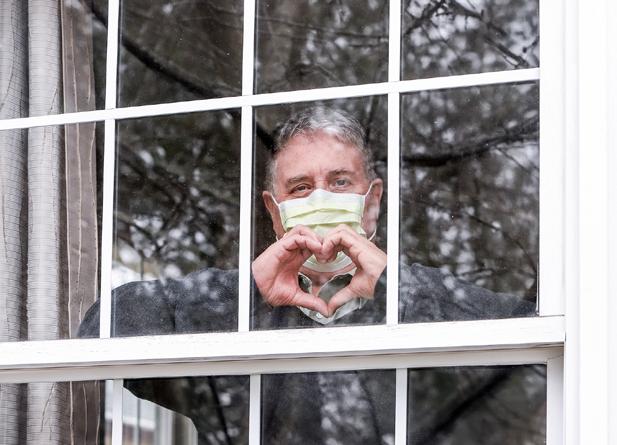
Dr. Frank Knoefel of Bruyère Research Institute (seated) and Carleton University student Haoyang Liu with a pressure-sensitive mat designed to monitor health during sleep.
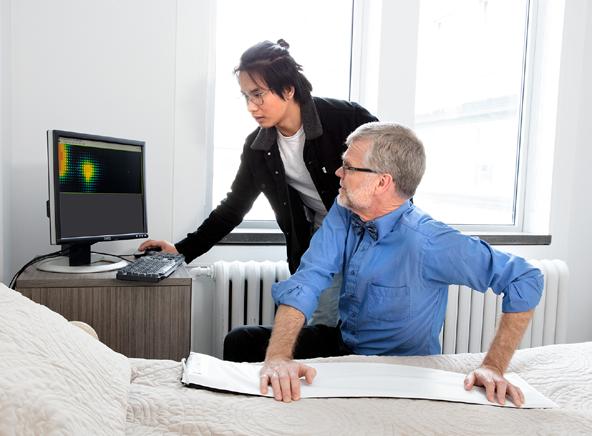
COVID-19 response
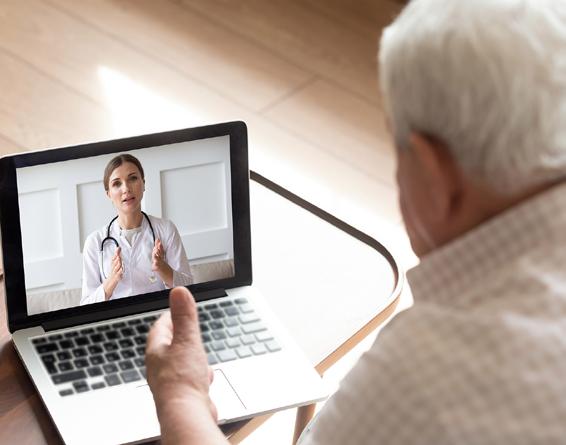
Our teams have developed COVID-19-relevant add-ons and plans to ensure their technologies can support older Canadians and caregivers, now and after the pandemic. The relevance of our projects is indisputable, with researchers working on systems that connect people, offer virtual care options, and make it possible for people to live more safely and longer in their own homes. Technologies such as effortless lifts and health-monitoring systems can make a difference for residents and staff in long-term care. And the list goes on.
AGE-WELL also launched new funding partnerships specifically targeted at COVID-19-relevant research. In September 2020, with our partner Mitacs, we co-funded awards to support industry-academic partnered R&D that will deliver technologies and services to benefit seniors and caregivers in light of COVID-19. The funded projects include service robots and a smart watch to monitor vital signs. z
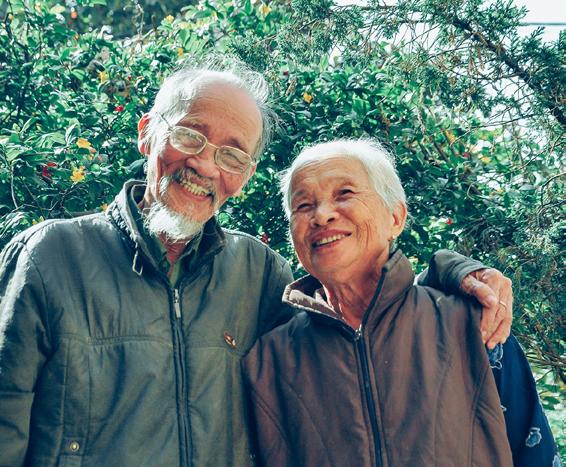
Key innovations
The pandemic has proven the value of innovations that help older adults live independently for as long as possible. It’s what most of us want and it has the added benefit of easing the burden on institutional care. These are just some of the AGE-WELL-supported products that can enable older people to continue to live healthily and safely in their own homes:
• Medication and daily life management app and service for people living with dementia
• Smart-home technology for aging in place (sensors, lighting, voice-activated reminders and prompts)
• Apps and remote therapies to help people manage their health at home, while staying connected to health professionals
• Non-intrusive health monitoring technology (no video or sound recording)
• Virtual exercise programs designed for older adults
• Digital games that connect, stimulate and encourage learning
• Socially assistive robots that prompt older adults with cognitive impairment to do daily tasks such as getting dressed, preparing meals and exercising.
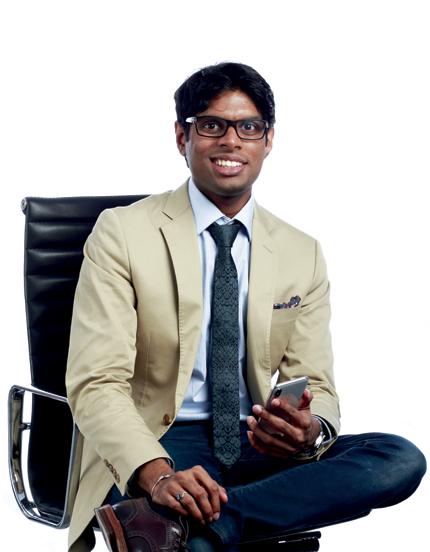
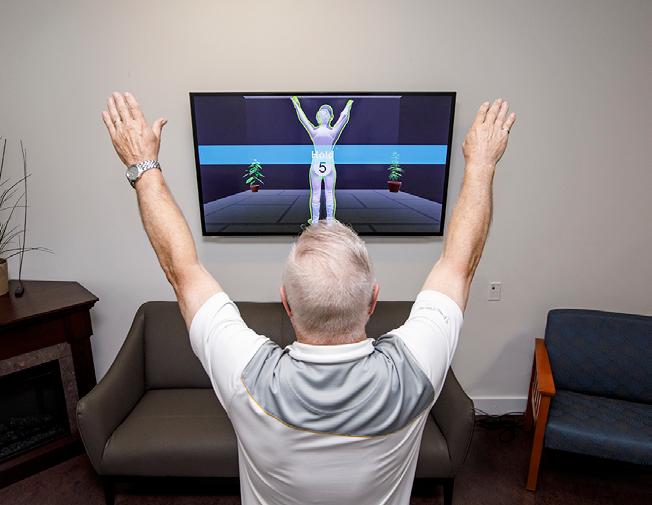
Shanil Gunasekara, chief executive of eTreatMD, with an arthritis-management app developed by his company with AGE-WELL support.
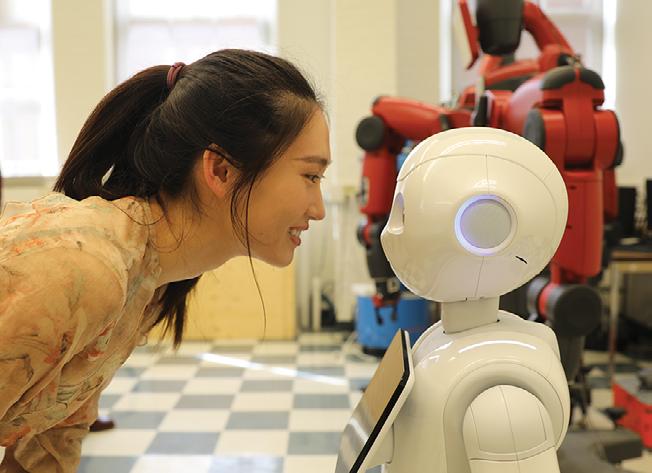
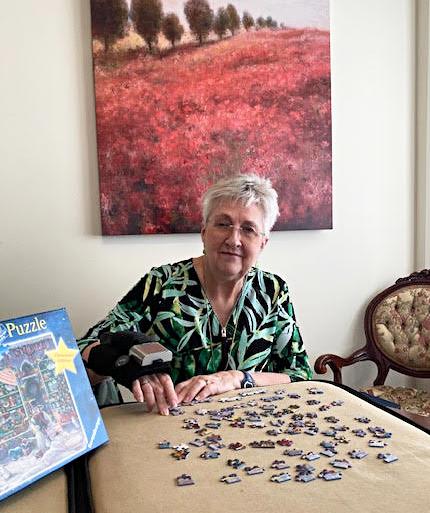
Smart glove
At age 75 and retired for 15 years, Betty Faulkner still regrets the career roadblocks she experienced due to her hand tremors.
“My tremor really affected me on a professional level,” says the former federal government auditor from St. Albert, Alberta. “I was going out to audit businesses and of course my tremors were bad. It was embarrassing...it was difficult. People just thought I was nervous, but I wasn’t.”
For Faulkner, the solution was to finish her career working in the office doing problem resolution for auditors who worked directly with clients in the community. While her role was rewarding, she still feels she could have accomplished more.
Faulkner has a family history of Essential Tremor. Both hands are affected by tremors but the right hand is worse and Faulkner is right-handed. She struggles to operate a computer keyboard and mouse, drink from a cup without spilling, and with many other daily tasks.
She tried medications to control her tremor, which developed slowly starting at age 25. The results have not been dramatic. She also considered surgical interventions including deep brain stimulation, but feared possible side effects such as memory loss.
Despite the COVID-19 pandemic that keeps the world traveller and her husband, Howard, home for now, Faulkner has a new lease on life thanks to Steadi-One, a compact battery-free stabilizing glove developed by AGE-WELLsupported Steadiwear Inc.
“I’ve had tremors for the last 50 years and finally we have some serious non-chemical help,” says Faulkner. “It’s worth its weight in gold.”
The glove “intelligently” stabilizes the wrist joint and forearm in people living with Essential Tremor and
Betty Faulkner says the Steadi-One smart glove “has given me freedom and independence to do things I want to do.”
Parkinson’s disease. It uses vibration damping and nanotechnology to provide resistance to hand tremors.
Since receiving the Steadi-One glove about a year ago, Faulkner has been busy doing many tasks and activities without having to ask for assistance. Howard Faulkner even made a video of his wife putting on make-up for the first time in decades. “Wow, I can do it...I’m getting some of my life back,” she says excitedly in the video.
“With COVID, I’m home—I’ve got asthma so I don’t go out. The glove has given me freedom and independence to do things I want to do, like a 1,000-piece jigsaw puzzle, with so little frustration,” adds Faulkner. “I have a feeling of control and I don’t have to ask for help.”
She is in regular communication with Steadiwear cofounders Mark Elias and Emile Maamary, to provide user feedback and as an early adopter of Steadi-Two, the second version of the glove which launches in January 2021. “I am so impressed with them.”
Steadiwear received the coveted Grandmothers’ Choice Award at the 10th Annual Startupfest in 2020. The company was also recently named one of the top 10 Canadian health-care startups by Polidea, a software and information technology company.
AGE-WELL funding over several years has helped to bring the stabilization glove to market, with the goal of enhancing life for people who have Essential Tremor and Parkinson’s disease, the most common movement disorders in the world. z
Technologies to help ease the crisis in long-term care
The COVID-19 pandemic has laid bare the need for technology-based solutions to support older adults and staff in long-term care. No technology can supplant the human touch in caring for older people. But if it can ease the burden for overworked staff, then it makes them better able to focus on their most important person-to-person duties. Technology can also improve safety for all. Some examples of AGE-WELL-supported products that can help:
• An easy-to-use communication platform for older adults who have limited or no computer experience (FamliNet) • A compact device that allows a single caregiver to transfer a person to and from a bed, without contact and without risking injury to either, in a dignified manner (Able Innovations)
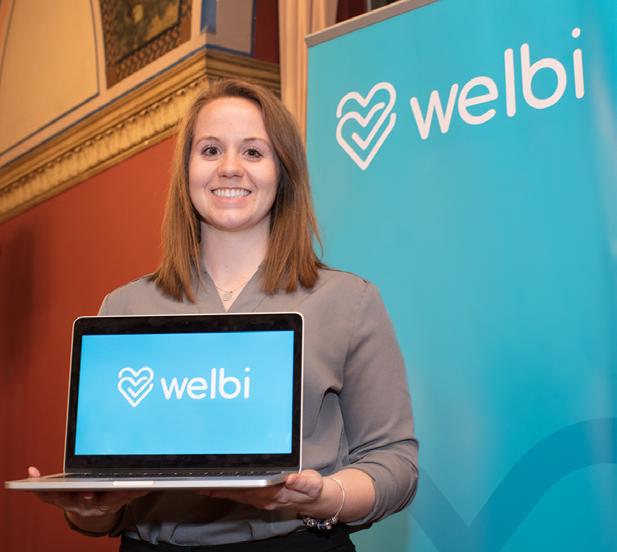
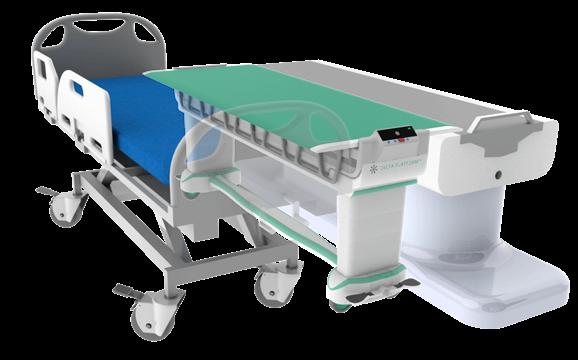
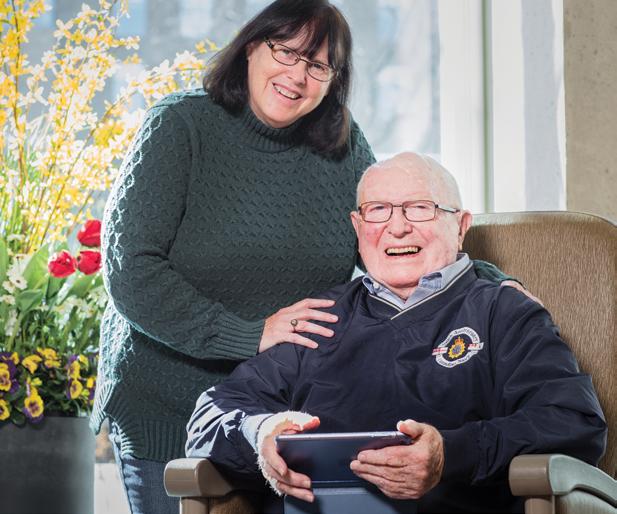
• A platform that personalizes recreation programs for older adults, and has built-in contact tracing capabilities (Welbi)
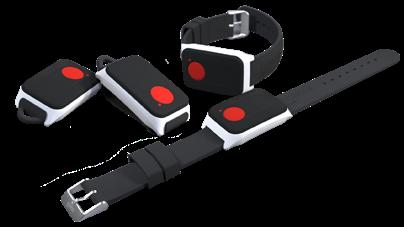
• A wearable device that can be used for contact tracing; if a resident, staff member or visitor tests positive, it provides a readout of every person who had been in recent contact—invaluable information in controlling an outbreak (Tenera Care)
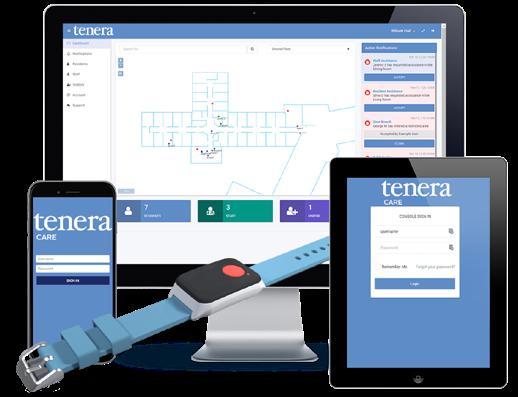

• An app to help staff record and monitor pain behaviours in residents with dementia who have limited ability to communicate their pain (PAIN-CARE)
Demos Night 2019 • A tablet-based assessment tool that analyzes a person’s natural speech to detect and monitor Alzheimer’s disease and other cognitive disorders. The tool records short samples of a person’s speech as they describe a picture on the screen (Winterlight Labs)
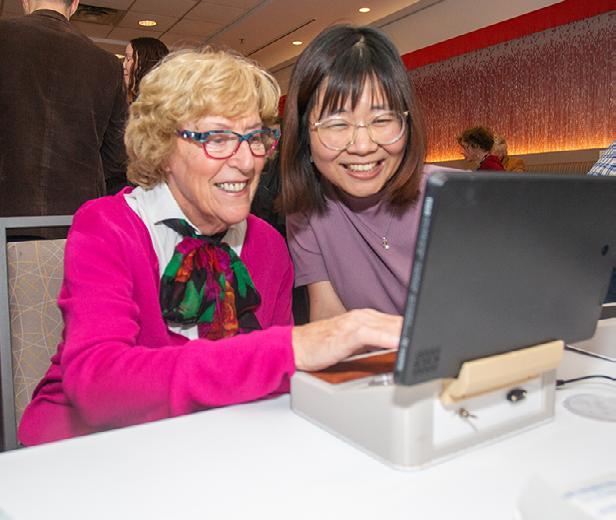
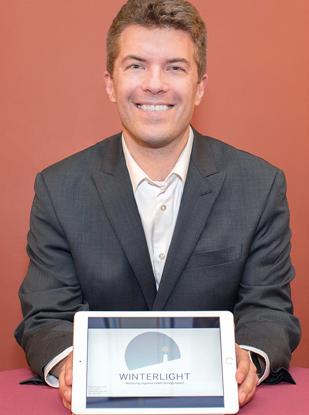
• Technologies designed to engage residents with cognitive impairment in physical and cognitive exercise, and to assess physical and cognitive status (Centivizer)
AGE-WELL researchers are also working on a longer-term initiative to identify and harness the potential of technology in long-term care settings across Canada. z
AGE-WELL Poll:
COVID-19 has significantly increased the use of many technologies among older adults
Older Canadians have upped their use of many technologies and online services during the COVID-19 pandemic, according to an AGE-WELL poll conducted by Environics Research in July 2020.
“At a time when older adults face enormous challenges, it is encouraging to see that many are reaching for technologies, online services and apps to help,” said Dr. Alex Mihailidis, AGE-WELL Scientific Director and CEO. “They are receptive to technology that allows them to stay in their own homes, and open to virtual health and virtual community with family and friends.”
Among the findings: • Over one-third (37 per cent)
• Two-thirds (65 per cent) of Canadians aged 65 and older now own a smartphone, compared to 58 per cent in 2019, and most who own one (83 per cent) use it daily.
• Thirty per cent of those 65+ are streaming (Netflix, Prime, YouTube, etc.); over 4 in 10 (45 per cent) of them report increased online streaming due to COVID-19. • During the pandemic, seniors have increased their use of video calls as a way to communicate with family and friends. About a quarter (23 per cent) of Canadians 65+ now use video-calling on their smartphones, twice as many as in 2019; 6 in 10 of whom report increased use due to COVID-19. • Fifty-seven per cent of Canadians
• Over a quarter (29 per cent) of Canadians 65+ use social media for “health, wellness and/or independence” (of whom 42 per cent report utilizing it more due to
• With many seniors staying at home more during COVID-19, two in 10 (19 per cent) of Canadians 65+ are using online shopping for essential items, like groceries, for “health, wellness and/or independence” (of whom 6 in 10 report utilizing it more due to COVID-19). • Thirteen per cent of Canadians 65+ now use exercise or activity apps or trackers; one in five (19 per cent) of those have increased their use due to COVID-19. say they use social media to communicate with family and friends (4 in 10 of whom report utilizing it more as a mode of communication due to COVID-19).
COVID-19). aged 65+ had a telehealth appointment in the past three months, and eighty-two per cent of those who had one were satisfied with it. Experience with video appointments is still limited (4 per cent).
The findings dispel any notion that older adults are technophobic, said Dr. Andrew Sixsmith, AGE-WELL Scientific Co-Director. “Most are unfazed by technology and they are using a lot of it during these challenging times. We were already seeing older adults using more technology, but COVID-19 is clearly a catalyst that is taking tech use to a new level.”
The survey also looked at the impact of COVID-19 on age-related concerns. The findings show that COVID-19 has affected attitudes toward aging. Fifty-one per cent of Canadians 65+ are now optimistic about aging, compared to 58 per cent in 2019.
About 1 in 2 (or more) of respondents aged 65+ are more concerned about health and losing loved ones, moving to a nursing home, and moving to a retirement home. And 65 per cent have felt isolated at least some of the time during the COVID-19 pandemic.
Impact of technology during COVID-19
On the positive side, 6 in 10 Canadians aged 65+ agree that technological advancements can help to lessen the impact of COVID-19 on daily life, maintain relationships with family and friends, reduce social isolation, pursue hobbies, stay independent, manage health as they age, maintain mental health, and stay active and in their own homes as they age.
The poll found that half of Canadians aged 65+ are willing to pay out-of-pocket for technology that helps manage health and wellness. Almost 7 in 10 (66 per cent) are willing to pay out-of-pocket for technology that allows them to stay at home as they age.
Seventy-two per cent of Canadians 65+ feel (at least somewhat) confident using current technology. However, 16 per cent say there is a lack of training on how to use technology and 9 per cent experience poor connectivity.
“Despite the increasing use of technology by seniors, we need to remember that some people are still losing out and there is a digital divide between the technology haves and have-nots. We need to make sure that technologies are accessible, affordable and available to all,” said Dr. Mihailidis. z
The poll surveyed 2,026 Canadians aged 50 and older. It was a follow-up to a similar survey done in 2019. For more details, see https://agewell-nce.ca/archives/10884

The Future of technology and aging in Canada:
AGE-WELL Challenge Areas
AGE-WELL’s eight challenges are designed to move the dial when it comes to supporting older adults and caregivers in Canada—and achieving social and economic impact. The challenge areas were identified through public consultations with over 1,000 stakeholders and a comprehensive review of policy priorities across governments in Canada and internationally, relating to seniors.
1.
2.
3.
4.
5.
6.
7.
8.
Supportive Homes & Communities
Health Care & Health Service Delivery
Autonomy & Independence
Cognitive Health & Dementia
Mobility & Transportation
Healthy Lifestyles & Wellness
Staying Connected
Financial Wellness & Employment
AGE-WELL National Innovation Hubs
AGE-WELL hubs are places where industry, community, government, researchers, end-users and others can interact and generate new ideas together. The aim is to foster more efficient development, testing and delivery to market of products and services that will benefit older people and caregivers across Canada. We have four national innovation hubs: Advancing Policies and Practices in Technology and Aging (APPTA) Fredericton, N.B. APPTA supports governments in generating opportunities to address the policy and practice challenges of an aging population. This hub is a partnership between AGE-WELL and the New Brunswick Health Research Foundation (NBHRF).
The Centre for Technology Adoption for Aging in the North (CTAAN) Prince George, B.C. CTAAN’s programs will streamline the process for the adoption of technology that enhances the lives of those aging in northern and rural communities in Canada. CTAAN’s founding partners are AGE-WELL, Northern Health and the University of Northern British Columbia (UNBC).
Digital Health Circle (DHC) Surrey, B.C. The Digital Health Circle supports the creation of new digital technologies that have a real-life impact on current and future generations of older adults. The hub is jointly championed by AGE-WELL and Simon Fraser University (SFU).
Sensors and Analytics for Monitoring Mobility and Memory (SAM3) Ottawa, ON. SAM3 is driving the development of sensor-based smart technologies that monitor older people’s health and wellbeing to keep them healthy, safe and as independent as possible. The hub is a joint initiative of AGE-WELL, Bruyère Research Institute and Carleton University. z
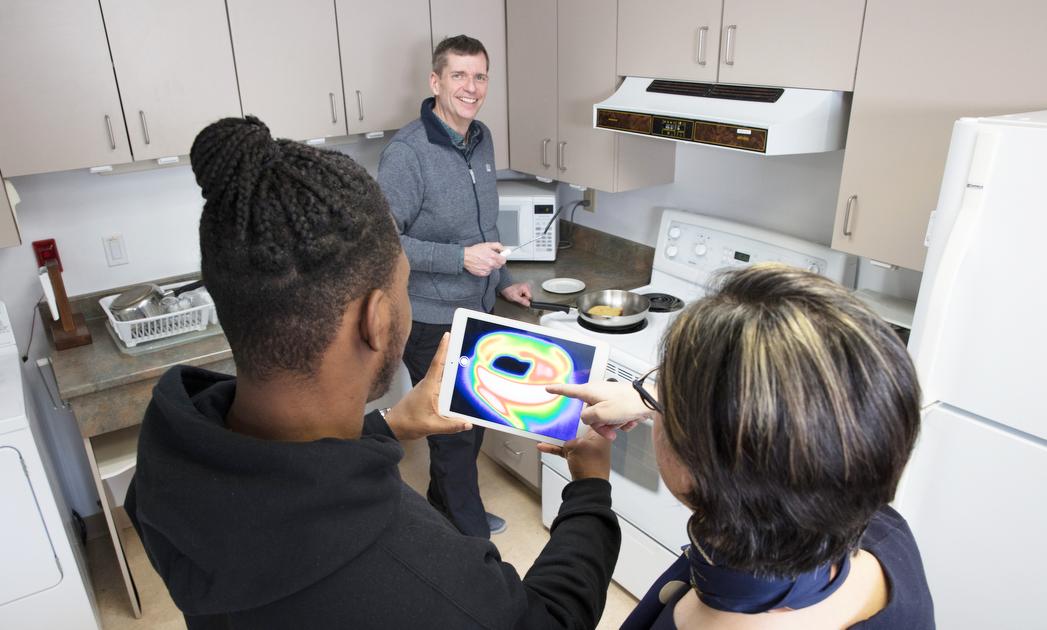
Advocating in the caregiving space
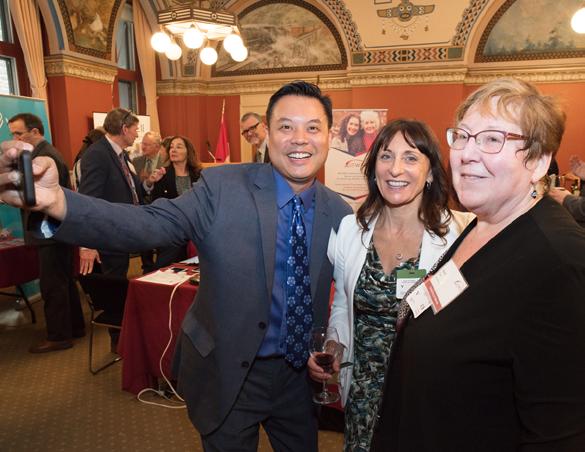
Ron Beleno understands aging and caregiving issues in a personal way. He looked after his father, who had Alzheimer’s disease, for the last 10 years of his life. Beleno knows firsthand how important it is to have support and resources available to navigate the caregiver’s journey. He has emerged as a leading advocate in the caregiving space.
For Beleno, sharing his experiences with a larger audience evolved organically. At first, other caregivers reached out to him for advice. As demand for his expertise grew, he became an advisor to not-for-profit groups and a sought-after speaker. He realized there was a need to have someone with his depth of understanding and skill set helping to guide others.
Beleno’s involvement with AGE-WELL began five years ago. He was giving a presentation at a meeting of the Alzheimer Society of Canada. Dr. Alex Mihailidis, AGE-WELL’s scientific director, was there. So was AGE-WELL researcher Dr. Lili Liu. After Beleno’s presentation, the two invited him to become part of AGE-WELL.
It was a natural fit. Beleno is a big believer in technology as a way to support older adults to live independently for as long as possible, and to assist their caregivers. While caring for his father, he used a variety of technologies, like a video monitoring system used for communication, to help his father continue to live safely at home.
Beleno was soon immersed in a number of AGE-WELL research projects, bringing great ideas, business savvy and an invaluable caregiver perspective. He collaborated with one team on a new website which helps consumers choose GPS technologies that can locate loved ones with dementia who wander. He is working on a localized alert system called Community ASAP that could help police find missing seniors.
Beleno also helped lead the formation of the AGE-WELL Older Adult and Caregiver Advisory Committee (OACAC) to advise the network as a whole. The OACAC brings the expertise and counsel of older adults and caregivers directly into network decision-making. “OACAC was created to be that connection piece that would allow older adults and caregivers to contribute and work with researchers at an equal level,” says Beleno, who is committee co-chair.
Ron Beleno, co-chair of AGE-WELL’s Older Adult and Caregiver Advisory Committee, attends AGE-WELL Day on the Hill in Ottawa in 2018.
Beleno’s selection as a recipient of the 2020 AGE-WELL Honorary Fellow Award was recognition of his substantial contributions to research and innovation in the AgeTech sector, as well as to AGE-WELL. “This award is humbling for me,” says Beleno. “It acknowledges the voice that an older adult and caregiver can have in the community, and the impact we can have on others. It says that sharing
my voice, my stories and my challenges are valued. This recognition is not mine alone. I share it with the voices of many others who channelled their stories through me.”
Looking forward, Beleno will be exploring new avenues to share his knowledge and continue to work with AGEWELL to change the narrative around aging and to provide caregivers with new hope and support.
“AGE-WELL makes a difference in many people’s lives— improving them by offering solutions, validation and policy changes,” says Beleno. “I know my dad would be proud of what we are accomplishing. I am grateful to community members, specifically older adults and caregivers, who have allowed me to be part of their lives, have a meal with them, break bread and to say, ‘We are all cheering for each other and we want you to succeed.’” z

